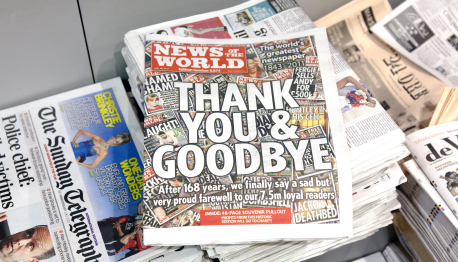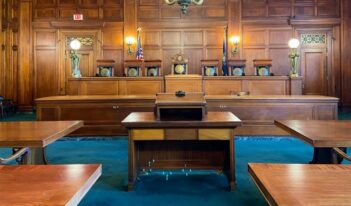
UK judge’s proposal faces opposition from free press supporters.
The British tabloids’ infamously invasive tactics came under fire last year when a phone-hacking scandal at Rupert Murdoch’s News of the World drew public outrage and grew into a full-fledged political firestorm. After the scandal, UK Prime Minister David Cameron ordered a public inquiry into improving the culture, practices, and ethics of the British press.
The inquiry concluded last week with a long-awaited report from Judge Brian Leveson, who recommended the creation of “an independent self-regulatory regime” underpinned by the law to help police the industry. Acting independent of Parliament, the regulator would need to have the power to impose a range of sanctions, including fines, demands for apologies, and reporting corrections. If industry did not create its own effective entity, Leveson called for Parliament to pass legislation to give necessary legal powers to a self-regulatory body and establish standards.
Among other recommendations in report:
- A committee composed of newspaper editors and independent members must establish a Standards Code for ethical journalism;
- The proposed regulatory body would have an arbitration system in place allowing victims to seek redress without the expense of costly litigation;
- The proposed regulator would replace the Press Complaints Commission (PCC), a voluntary regulatory body with no legal powers. Newspapers may choose to be regulated by the Office of Communications, which currently regulates British broadcasting, the most trusted form of news in Britain.
Despite having appointed Leveson to lead this inquiry, Cameron publicly rejected Leveson’s recommendation for passing legislation to create a regulatory body, citing concern that such action may infringe the rights of free speech and a free press.
While Britain does not have anything comparable to the United States’ First Amendment, which bars the government from making any law abridging the freedom of the press, the country has a long tradition of a free press. The key question is whether Leveson’s proposed legislation would overstep the boundaries of a British free press.
Leveson claims that he is not proposing to create a government-run regulatory body, but rather that he is proposing to legislate certain criteria for a self-regulating agency. The press industry would need to come forward with an agency that meets these standards. Perhaps anticipating questions about the freedom of the press, Leveson specifically stated in the report that the new legislation would enshrine a duty on the government to “protect the freedom of the press.”
Many members of the British press expressed support for Cameron’s rejection of Leveson’s proposed legislation. Some academics expressed opposition to Leveson’s proposal. For example, Professor Tim Luckhurst of University of Kent, pointed out that Leveson’s legislation would lead to “reporting that would impose on the majority the tastes of a narrow cultural and intellectual elite.” He claimed that the innocent victims of phone hacking have or will receive their deserved compensation and that the proposed regulation of the press would do more harm to liberty than it would do good for potential victims.
Luckhurst further argued that “[s]tate involvement in the regulation of journalism destroys public trust” and that, consequently, Britain should adopt a guarantee of non-interference with the press, similar to the First Amendment in America.
Still, Leveson’s proposal is not without supporters. Brian Cathcart, director of Hacked Off, an organization that represents the victims of phone hacking by the press, responded to the Prime Minster’s rejection by saying that the report sets out a “workable, proportionate, and reasonable solution,” to an out-of-control press wrought with lies and slander, and that by rejecting it Prime Minister Cameron has not done his job.
The impact of the Leveson report remains to be seen. Cameron had reportedly promised earlier that he planned to implement the recommendations as long as they were not “bonkers,” but his initial reaction has been to attack Judge Leveson’s recommendation for new legislation. Deputy Prime Minister Nick Clegg and minority Labour leader Ed Milliband publicly showed support for Leveson’s findings and much of the proposed legislation.



